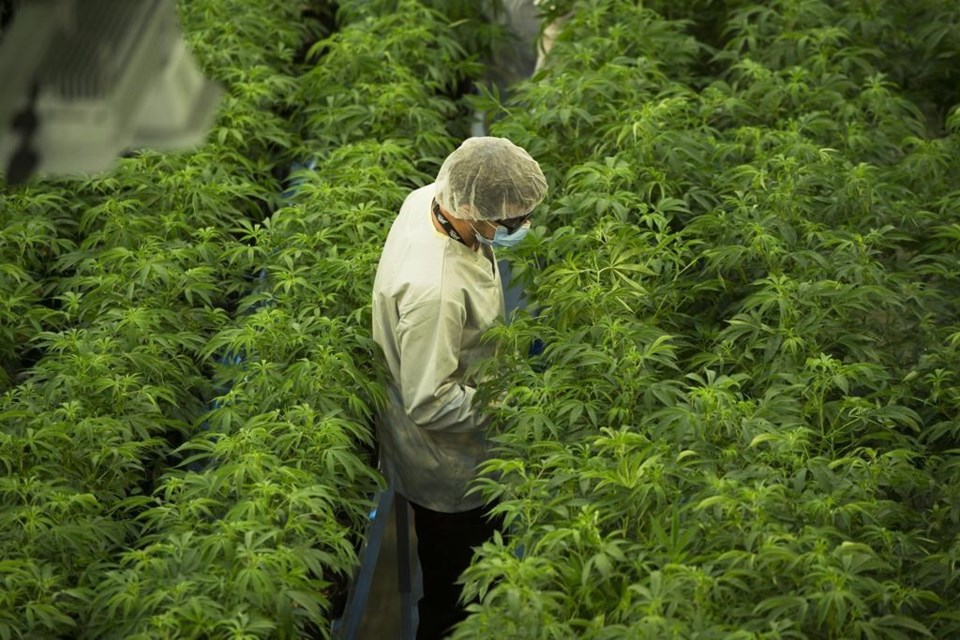Canopy Growth Corp. executives argued the company is advancing toward profitability, even as it booked a $1.72 billion non-cash writedown that contributed to a net loss of more than $2 billion during its most recent quarter.
"Maybe our aspirations have changed over the last several years, but we believe that we can get ourselves, with the right focus in the right categories, to a profitable business that's not burning cash in the Canadian market," said CEO David Klein, on a call with analysts.
"I don't want anybody to think that we're not spending almost all of our waking hours on...stopping the cash burn in Canada."
His remarks came as the Smiths Falls, Ont. company behind the Tweed, Tokyo Smoke and Doja brands said Friday that its first quarter net loss compared to net earnings of more than $389 million at the same time last year.
The impairment charge for the period ended June 30 was linked to Canopy's pot operations and came as its recreational business-to-business cannabis sales fell 38 per cent since last year because of price compression and increased competition.
"The Canada market has really developed very differently than we had initially expected," Judy Hong, chief financial officer, admitted on a call with analysts.
She named market fragmentation, the strength of the illict market and regulatory hurdles, including a slow move toward federal legalization in the U.S., as the company's biggest challenges.
Such conditions have prodded Canopy into refocusing its product mix on the premium sector, which typically commands higher prices and generates a more loyal consumer basis than value items.Â
The move toward premium has been coupled with an ongoing cost-cutting plan involving retooling its facilities, reviewing procurement strategies, implementing flexible manufacturing processes and reducing third-party professional and office fees.
As part of the plan, 243 Canopy workers spanning Canada, Europe and the U.S. lost their jobs in April, the latest in a string of layoffs Canopy and its rivals have carried out during the COVID-19 pandemic.
Canopy anticipates its moves will create between $100 and $150 million in savings within a 12-to-18 month range and — like a series of other cannabis companies who have embarked on overhauls recently — help it reach profitability by better aligning supply with demand.
But many barriers stand in the way of this goal.
In the most recent quarter, Canopy's largest U.S. distributor faced financial challenges causing it to pause orders and the company is now having to work to reestablish ordering patterns that were lost, Hong said.
Consumer spending power is also softening as Canada encounters a near 40-year high inflation level mirrored by several other countries. Increased inflation has already moderated European and North American premium vaporizer sales, Hong said.
Supply chain challenges from previous quarters have stuck around too and been an issue for its Storz and Bickel vape brand in particular.
"Our procurement, engineering and manufacturing team are working hard to identify solutions for these challenges, including alternate components and suppliers and we expect this to be manageable," Hong said.
While Canopy works to address these issues, Klein added that it is still keeping an eye on the U.S.
In recent weeks, Senate Majority Leader Chuck Schumer introduced the Cannabis Authorization and Opportunity Act, which could help federally legalize marijuana, though observers aren't hopeful it will be enacted.
"There's no doubt that we put heavy emphasis on the U.S. market, which is evolving... more slowly than we would like," said Klein.Â
He noted that two thirds of Americans already live in a location that has access to cannabis in some format, "but the federal government still refuses to recognize that reality."Â
"So putting that aside...we're not waiting," he said. "We continue to see the U.S. is the largest and most important market in the world."
To advance its U.S. strategy, Canopy signed a deal to acquire edibles company Wana Brands, if Canada’s neighbour moves to allow a key pot component.
Canopy has made similar arrangements with TerrAscend Corp. and Acreage Holdings Inc. and deepened its U.S. presence by launching four sparkling cannabidiol waters under the Quatreau name across the border in March 2021, adding to the roster of Martha Stewart, BioSteel and This Works products it already sells in the U.S.
The company's first quarter net loss amounted to a loss of $5.23 per diluted share compared to a loss of 84 cents per share in the second quarter of 2021.
Analysts expected the company to report a net loss of US$111.6 million or 28 cents per share, according to financial data firm Refinitiv.
Net revenue for the period amounted to $110.1 million, down 19 per cent from $136.2 million in the same quarter last year.
Following the release of those figures, Canopy's share price dropped about 40 cents or 11 per cent to $3.29 as the stock market opened. By mid-morning, it was trading at $3.42.Â
This report by The Canadian Press was first published Aug. 5, 2022.
Companies in this story: (TSX:WEED)
Tara Deschamps, The Canadian Press



